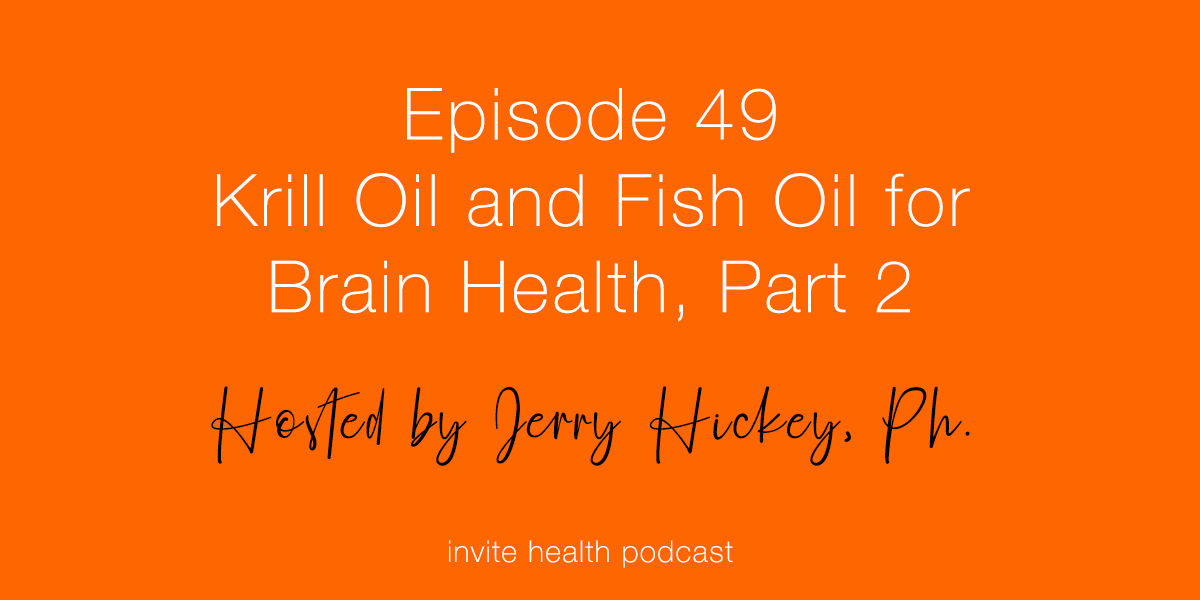Krill Oil and Fish Oil for Brain Health, Part 2 – Invite Health Podcast, Episode 49

Invite Health Podcast, Episode hosted by Jerry Hickey. Ph
Subscribe Today!
In part one, I discussed the benefits of fish oil for brain health. Now, we are going to discuss Krill Oil’s superior benefit for brain health. Let’s get started.
Click here for Part 1: Krill oil and Fish oil for Brain Health. Listen now >>
What is Krill Oil?
Krill oil has fish oils attached to Phosphatidylcholine and also contains the powerful antioxidant astaxanthin. This has many advantages and even more benefits for the brain than fish oil.
Fatty ocean fish and crustaceans have omega-3 fatty acids which are commonly referred to as fish oils. You take Fish Oil capsules for their omega-3 content but you can also take Krill Oil because of it’s Omega-3 Content. However, Krill – because of the way the Omega-3 Fatty acids are supplied (they are attached to phosphatides) – has additional advantages over fish oils.
The Differences Between Krill Oil and Fish Oil
Here are the differences:
- Krill has phosphatidylcholine for memory – fish oils and most foods do not. About 90% of Americans fail to obtain adequate choline from their diet for their memory.
- Krill has Astaxanthin for the eyes and brain– it functions as an antioxidant to reduce inflammation and protect cells. Fish oils do not have Astaxanthin.
- Krill has phosphatides for memory – fish oils do not
- Krill’s fish oils are attached to phosphatides, protecting them from your digestive juices so they are much better absorbed. The capsule required is much smaller and easier to swallow; fish-sourced fish oils are attached to triglycerides, which do not protect them from your digestive juices so they are not absorbed as well. However, this does not apply to enteric coated fish oils; the coating protects them.
- Krill is very fresh – fish oils (if not enterically coated) are commonly oxidized. This does not apply to enterically coated fish oils, which are also protected from spoilage.
- Krill also supplies some omega-6 fatty acids for the immune system and omega-9 fatty acids for heart and brain health.
- Krill creates plasmalogens to protect the aging brain to a greater extent than fish oils. Antioxidant levels decline in the brain with age allowing free radicals to accumulate in the brain and these kill brain cells. Plasmalogens offer an alternative solution for protecting brain cells by functioning as a protective shield.
- Krill supplies glycerophospholipids to protect the cells in your brain from decay; these krill ingredients protect the structure of each brain cell.
- Both Krill and Fish Oils support the glymphatic system- the system that removes waste products with age. This system slows with age and Krill works better at rejuvenating it.
Thank you for tuning in to the Invite Health Podcast. You can find all of our episodes for free wherever you listen to podcasts or by visiting www.invitehealth.com/podcast. Make sure you subscribe and leave us a review! Follow us on Facebook, Twitter and Instagram at Invite Health today. We’ll see you next time on another episode of the Invite Health Podcast.
